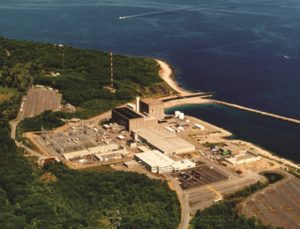PLYMOUTH — A pair of state legislators who represent Plymouth have proposed a bill that would reduce the size of the Nuclear Decommissioning Citizens Advisory Panel (NDCAP) from 21 people to 15 and ensure that five of the members would be appointed by elected officials or community organizations in Plymouth.
Several of the current at-large seats appointed by the governor or Mass. House speaker would be removed, including the one held by Andrew Gottlieb, executive director of the Association to Preserve Cape Cod.

The NDCAP was established by state law in 2016, three years before the Pilgrim Nuclear Power Station shut down permanently. Its charge is to provide advice on Pilgrim’s decommissioning. Its current composition includes representatives from several state agencies and people from Plymouth and surrounding towns, including Cape Cod.
Representatives from the state agencies would remain on the reconstituted panel, which the bill would rename the Pilgrim Decommissioning State Oversight Panel, but the people now representing communities beyond Plymouth would likely go.
State Rep. Mathew Muratore, a Plymouth Republican, said his town “has taken a back seat in this for a long time.
“People forget Plymouth is the host,” said Muratore, who presented the bill for the new legislative session and announced its filing at the Jan. 23 NDCAP meeting. He was accompanied by state Rep. Kathleen LaNatra, a Plymouth Democrat who has also signed on to the bill.
“We need a bigger say now,” said Muratore. “When the water is dealt with, what’s left?” he asked, in reference to the current debate over the disposal of 1.1 million gallons of contaminated water from the spent fuel pool and other systems.
“The land is left,” he said. “Let’s add Plymouth to the conversation now that this is coming to an end.”
Plymouth officials have long been interested in the 1,700 acres previously owned by Entergy Corp. and now by Holtec International. The nuclear plant sits on only 200 of those acres, and much of the rest would be prime land for development.
For years, local officials have voiced the hope that the owner of the plant would give the land to the town, although that’s never happened. Plymouth does hold the right of first refusal, according to town documents.
“If the Town were able to purchase the 1,500 acres there is an opportunity to balance open space initiatives as well as development,” states the Plymouth Open Space Plan. Much of the land is forested.
If Muratore’s proposed bill were enacted, several panel members from the Cape and towns surrounding Plymouth would be removed.
Appointments that had been made by the governor and House speaker would instead be made by the chairman of the Plymouth Select Board, who would appoint one representative from his panel and another Plymouth resident from “the environmental community.”
Two at-large appointments would be made at the recommendation of a state representative and a state senator who represent Plymouth. The current seat for the representative from the Old Colony Planning Council, a regional planning agency that serves 17 towns neighboring Plymouth to the north and west, would instead go to the Plymouth Regional Economic Development Foundation.
Also on the board would be a retiree from the Pilgrim Nuclear Power Station who has technical expertise in environmental areas or physical security.
“My thought is that this is overly focused on Plymouth,” said advisory panel member Mary Lampert, a Duxbury resident. “I just want to make sure the broader community voice is heard.”
Gottlieb pointed out that there has been no resolution to the debate over Holtec’s plan to release wastewater from the plant into Cape Cod Bay. “My concern would be that people don’t think the issues around the release of the water have been adequately addressed,” he said.
Muratore said the state has a powerful oversight role based on the 2020 Memorandum of Understanding signed by state authorities and Holtec. It’s time for the state to step up and play that role, he said, “making sure Holtec is doing what it should be doing.”
The agreement, forged as part of a court settlement, carries assurances of environmental, public safety, and financial protections, the state representative said. “I think with the MOU, we have everything covered the best we can,” Muratore said.



